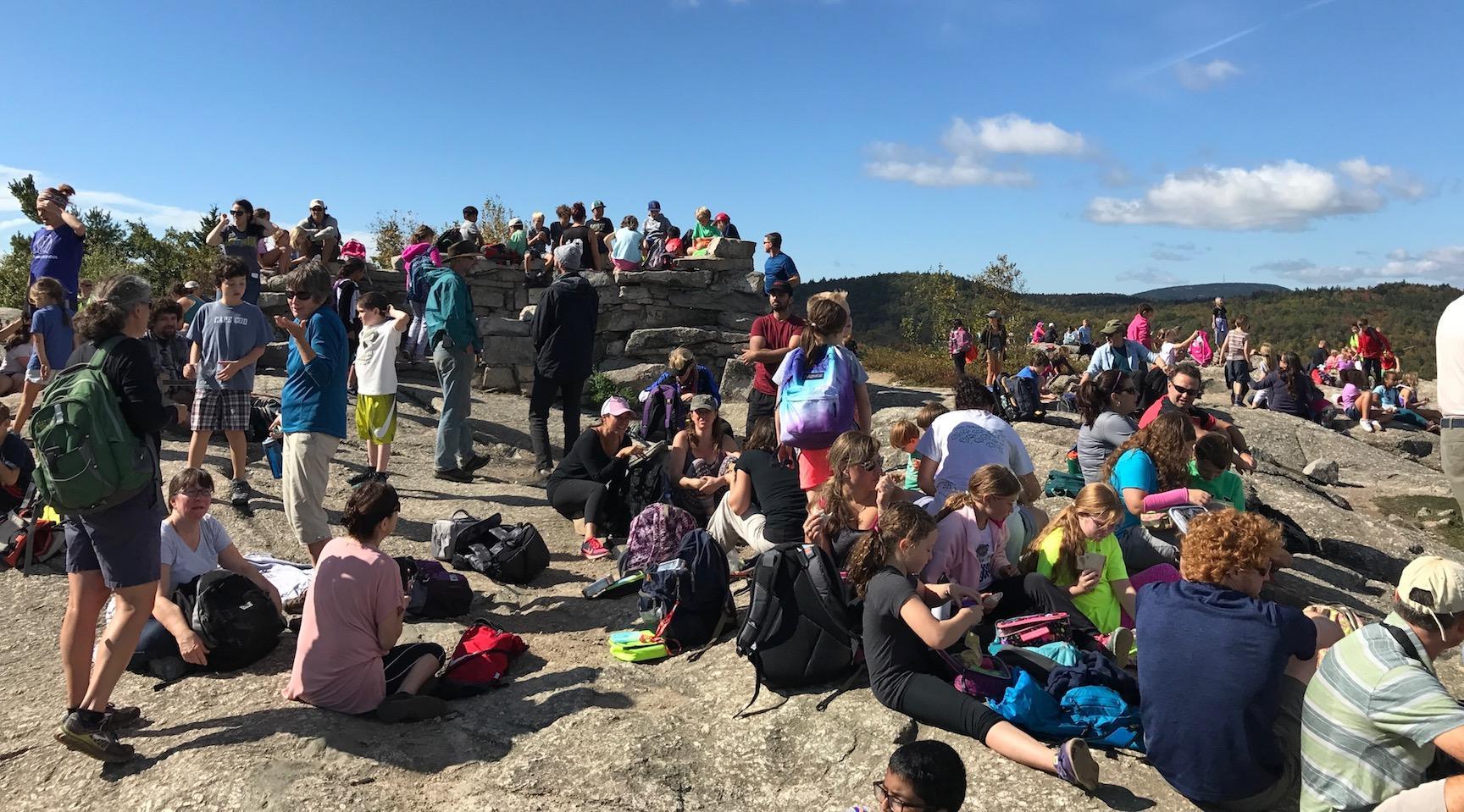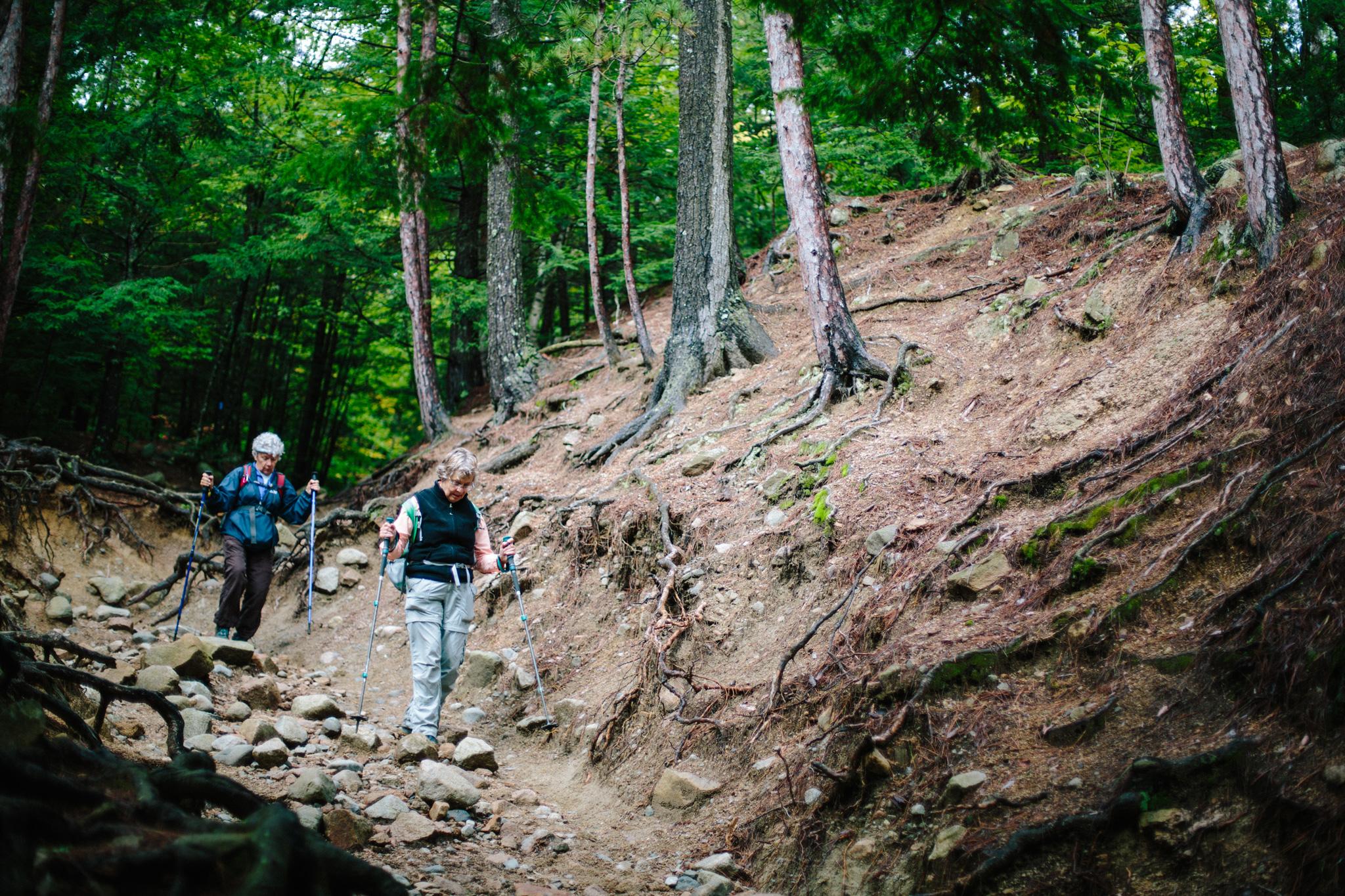Can 80,000 hikers leave no trace?
- Tags:
- Mount Major,
- Recreation,
- Stewardship

It is stunning, even for those who can’t quite imagine what it must be like to summit Mount Everest to see the recent pictures of climbers ascending the 29,000-foot peak in long lines that make it seem more like the line for Space Mountain at Disney World. Does Mickey Mouse greet them along the way and does he need supplemental oxygen?
We have a tendency to love our favorite—or most exotic--places to death in pursuit of shared experience or bragging rights. If we didn’t get a selfie or a bumper sticker, were we really there?
Closer to home than Nepal (and much warmer) we have two of the most-climbed mountains right here in New Hampshire. Mount Monadnock (conserved by the Forest Society) is often cited as the second-most climbed mountain in the world (after Mount Fuji) with approximately 125,000 hikers annually.
And if you’ve ever driven along Route 11 in Alton on a summer weekend and seen all the cars parked along the roadway, then you know that Mount Major isn’t far behind. A rough survey conducted a few years ago suggested that hikers climb Mount Major as many as 80,000 times every year, plus dogs and (yes) donkeys.

Mount Major is a favorite destination for so many because of its reputation for being a relatively short hike with a big-time reward—a view north across Lake Winnipesaukee to the White Mountains. It’s located in Alton, an easy drive from populated parts of southern New Hampshire and northern Mass. For many tourists and second-home owners, it’s become a traditional part of a summer stay in the Lakes Region.
The Forest Society partnered with the Lakes Region Conservation Trust and Belknap Range Conservation Coalition a few years back to permanently protect land on Mount Major that hosts some of the trail to the summit, and today the Mount Major trailhead is one of our 185 Forest Reservations. Acquiring the land is only the first step, however. Conservation is also about caring for the resource, and we knew going in that the Mount Major trails need some TLC to address excessive trash, damage to vegetation, trail erosion and disturbance to wildlife. Caring for the resource is about protecting the experience of those 80,000 hikers.
This year, Mount Major has been chosen as one of 19 “Hot Spots” nationwide by the Leave No Trace Center for Outdoor Ethics. As a designated Hot Spot, Subaru/Leave No Trace Traveling Trainers will teach Forest Society staff, partners and volunteers how to communicate the principles of Leave No Trace to the public. The trainings and several other outreach and public service events will take place during a “Hotspot Activation Week” from June 17-24, 2019.
There are seven Leave No Trace principles: Plan ahead and prepare; hike on durable surfaces; dispose of waste properly; leave what you find; be careful with fire, respect wildlife; and be considerate of other visitors. This summer, hikers at Mount Major will have the opportunity to learn about LNT principles and how following them can help us protect this much-loved hiking destination- while still making time for that summit selfie.
Events during the Hot Spot Activation Week include:
Hit the Trail Trivia Night, Tuesday, June 18 from 7 p.m. to 9:30 p.m. at Area 23, 254 North State Street, Concord where participants can enjoy great food and beverages while testing their knowledge of trees, trails and Leave No Trace with the Forest Society’s Dave Anderson.
Leave No Trace for Youth Educators Workshop, Wednesday, June 19 from 2p.m. to 5 p.m. at the Gilman Museum, 123 Main Street in Alton. This free workshop is for public and private school teachers, camp counselors, homeschoolers, and environmental educators of all types who want to learn more about Leave No Trace principles and how to teach youth about responsible outdoor recreation. For more information and to sign up, click here.
Mount Major Volunteer Service Day, Thursday, June 20 from 10 a.m. to 3 p.m. at the Mount Major Forest Reservation in Alton. The Forest Society and Leave No Trace, along with other partner organizations, including the Belknap Range Conservation Coalition (BRCC), Lake Region Conservation Trust (LRCT), and the Belknap Range Trail Tenders (BRATTS), will be organizing trail projects on Mount Major as part of the Leave No Trace Hot Spot Program. Learn about Leave No Trace principles while helping to clean up and document trash, or improve trail conditions on these busy hiking trails. Participants should wear sturdy hiking shoes and bring a bag lunch and water bottle, as well as work gloves. For more information, click here.
Jack Savage is the Executive Editor of Forest Notes, the quarterly magazine of the Society for the Protection of New Hampshore Forests. He can be reached at jsavage@forestsociety.org.
